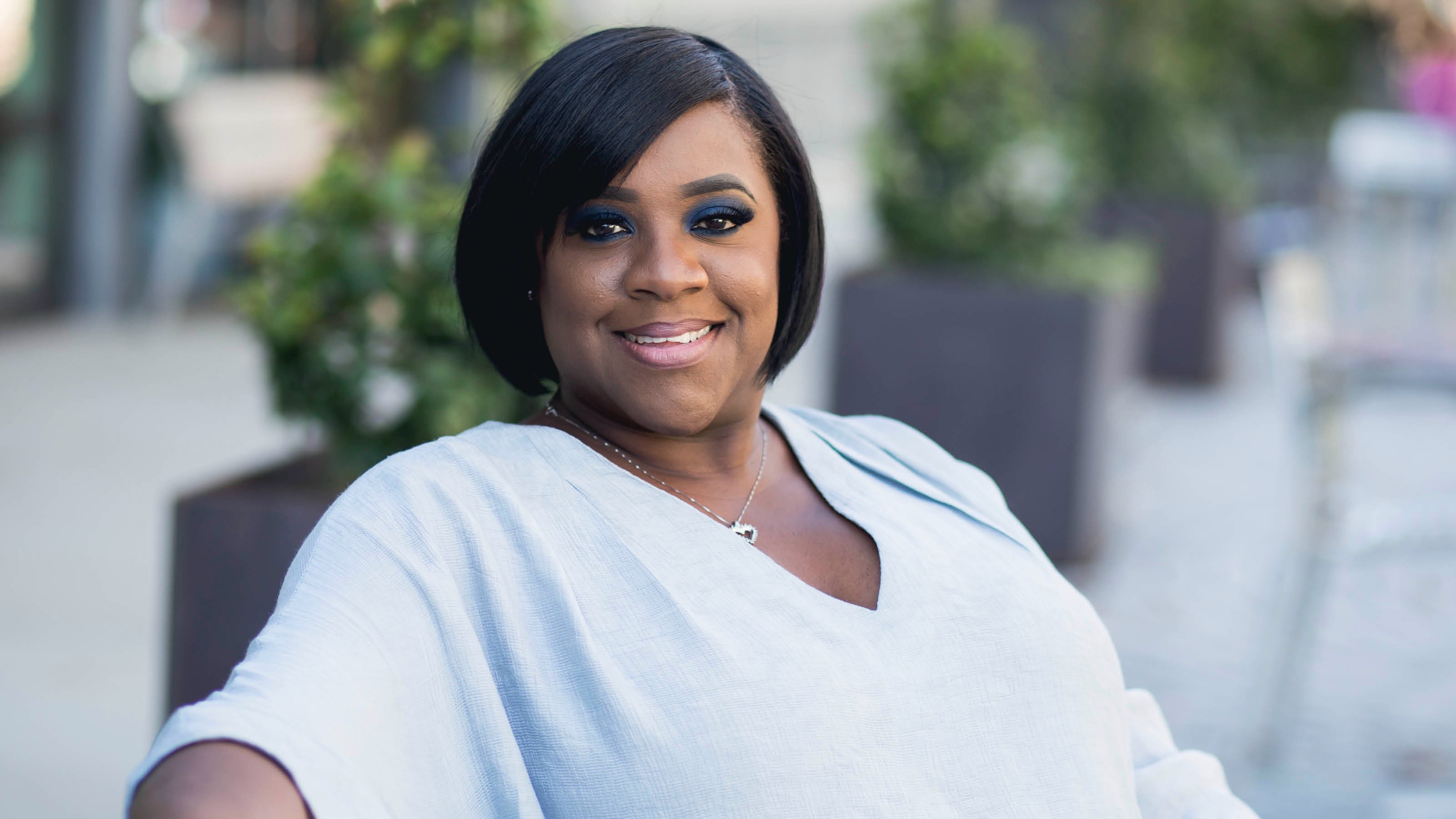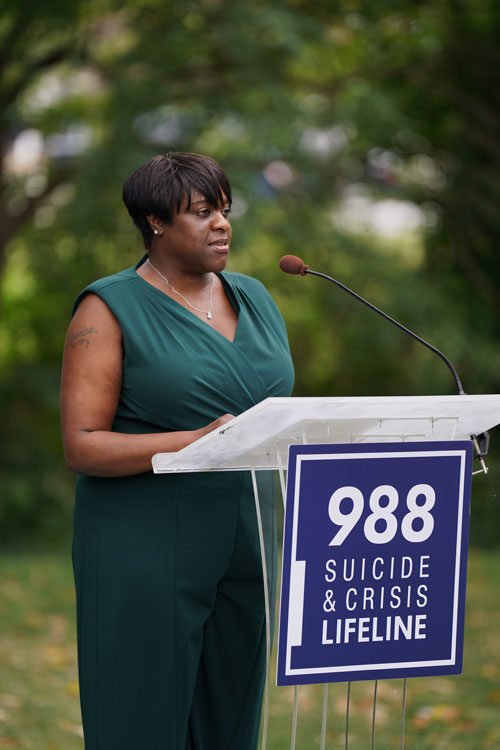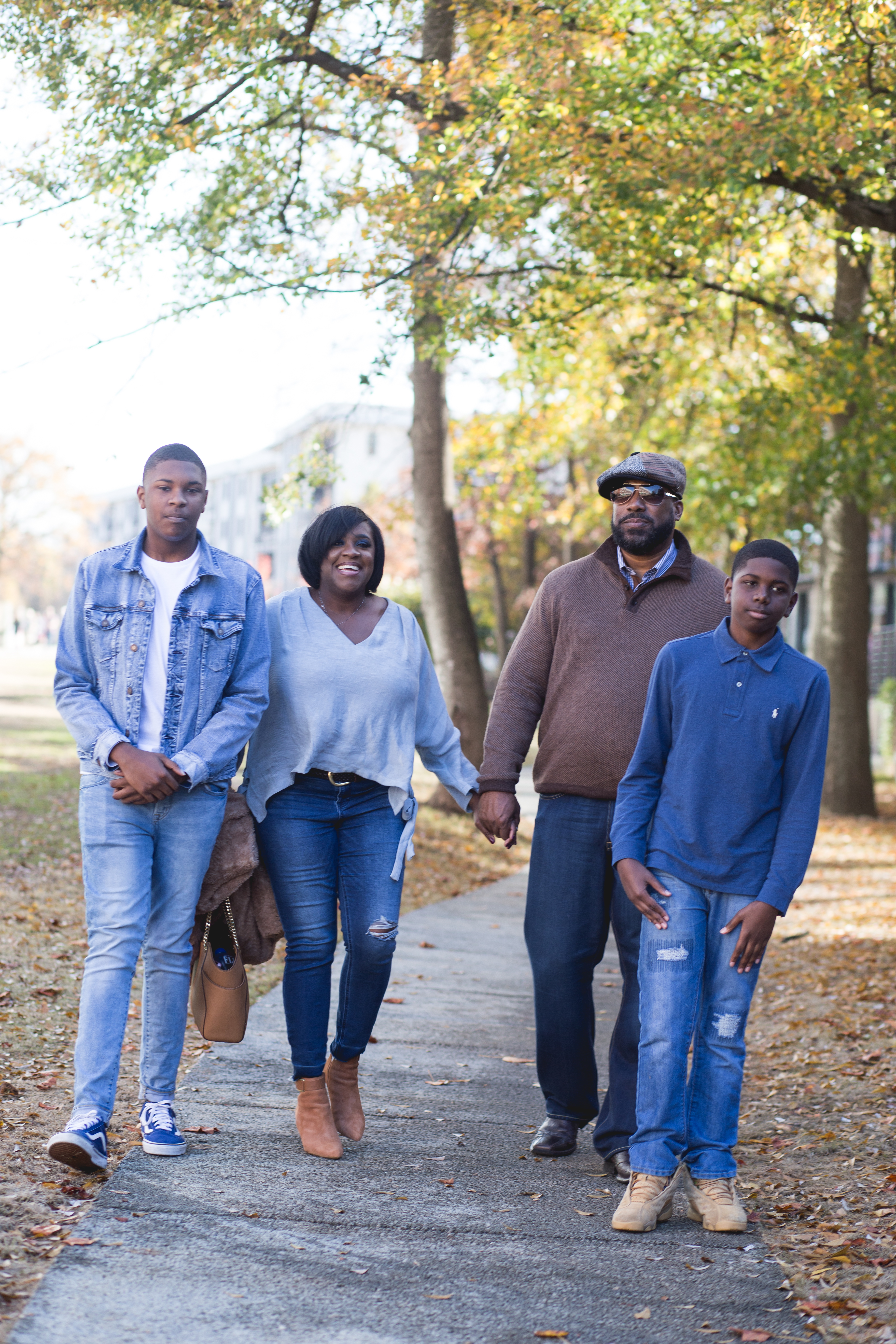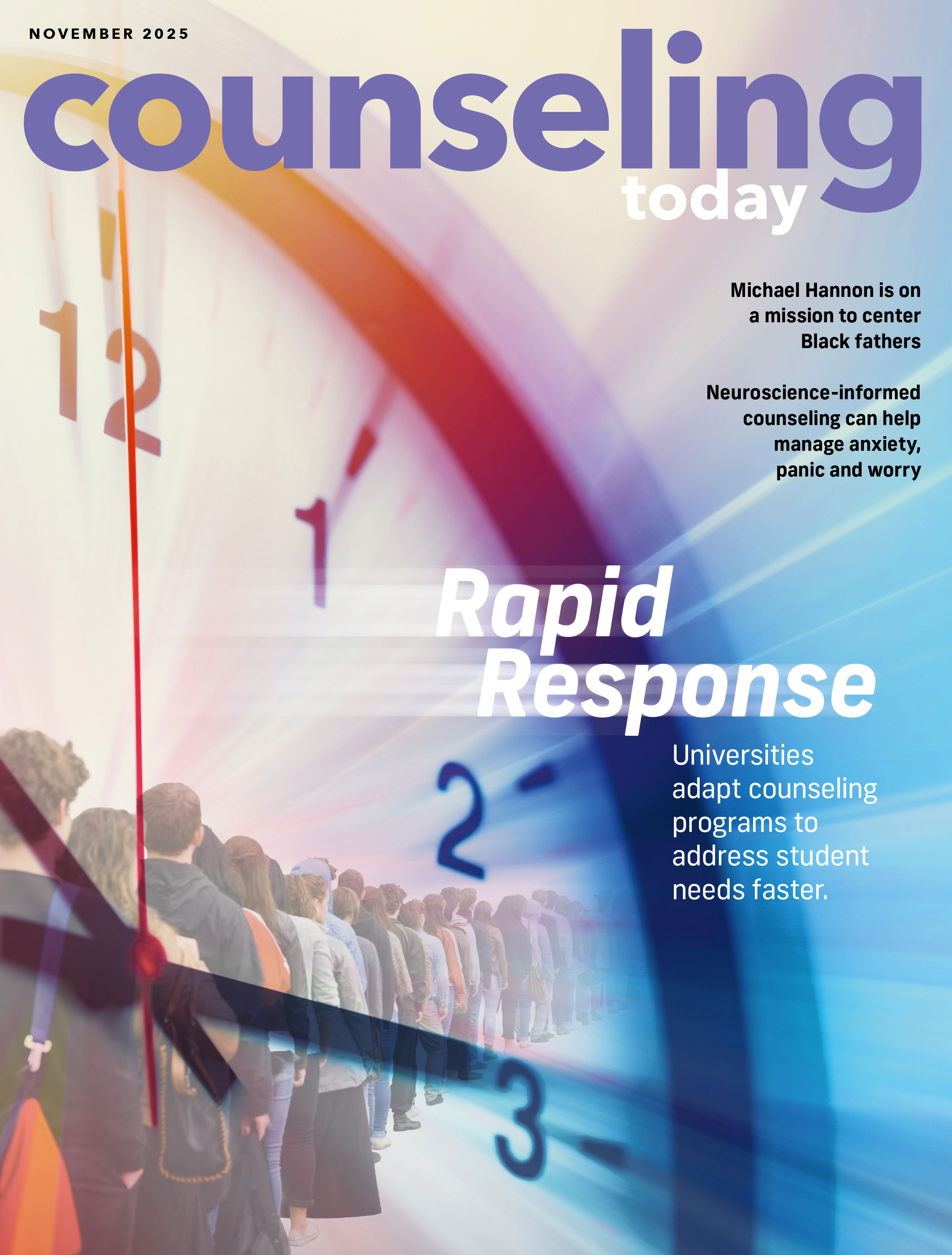Crisis Communicator
By Melanie Padgett Powers
March 2024

As a college student, Monica Johnson, LPC, wanted to be a crisis communications “fixer” in Washington, D.C., not unlike Olivia Pope from the hit TV show Scandal. But a school transfer and a pointed comment from an adolescent girl changed Johnson’s career trajectory.
Johnson is now the director of the 988 & Behavioral Health Crisis Coordinating Office at the federal Substance Abuse and Mental Health Services Administration (SAMHSA). She is the first director of the new office, which oversees the implementation and oversight of 988, the national three-digit number for mental health support.
“I spent my whole career (27 years) in behavioral health, and I can say without hesitation that the work I’m doing in this very moment definitely is what I’m most passionate about,” Johnson says. “It is the most transformative initiative I’ve been involved in since I have been working in this field.”
Johnson started out as a public relations (PR) major at Georgia Southern University. But when she transferred to Kennesaw State University in Georgia, the school didn’t have a PR major. Through a work study rotation in Georgia Southern’s counseling program, she had developed an interest in psychology, so that became her new major (with a minor in communications).

But it was an entry-level job that really steered her toward counseling. “I was the person who felt like — and I give this advice to this day to students — that if you think you want to do XYZ, you need to surround yourself with people who do XYZ,” she says.
As a college undergraduate, she landed a part-time job as a service tech at a children’s psychiatric residential treatment facility, working in a unit with adolescent females.
Her first day on the job was a memorable one. The girls and staff took a field trip to a nearby lake. “It was a great day,” she recalls, “and I thought ‘gosh, this is amazing.’” But back at the cottage, Johnson found herself the only staffer in the room when two girls got into an altercation.
“One of the residents threw a chair — I say at me, but I think in hindsight, it was just thrown my way. It missed. Long story short, we processed that event when it was stabilized,” she says.
Luckily, no one was hurt. Johnson sat the girls in a circle, but before she could start the discussion, one of the girls, a natural leader, said, “So, go ahead and tell us — we know today is going to be your last day.”
Surprised, Johnson replied, “It was my first day; why would it be my last?” She still remembers the girl and how she looked at her when she said: “Because no one ever stays.”
Johnson stayed. For three years, she worked with the girls while going to college and later graduate school at Argosy University in Atlanta, earning her master’s in professional counseling/psychology. “Continuing to be around those girls for that time, it really made me settle upon [the idea that] I want to help people; this is what I want to do.”
An Unexpected Pivot
A few years later, Johnson was working at a behavioral health organization in her home state of Georgia when the CEO, who was also her mentor, said something unsettling: “Monica, your job is posted.”
She was confused. Was she being fired? No, he clarified, the ideal job for her was posted on the Georgia state government website. She was skeptical: “I was so not interested in going into state government, I promise you. Of the things on my list of the possibilities of what I would do, that was not even on the list.”
But her mentor encouraged her to at least apply. The position was for a child and adolescent mental health state director, and she easily landed the job. Her new supervisor told her later that he knew within the first five minutes of her interview that she was the perfect person for the new position.
Johnson loved her new job, but after only nine months she was “reluctantly pushed into a promotion” as the community mental health director, where she served for three years. Next, she was promoted to division director for Georgia’s Division of Behavioral Health, a position she held for eight years. She also served briefly as the interim commissioner for the Georgia Department of Behavioral Health and Developmental Disabilities.
As division director, she led all things behavioral health related, which included children’s mental health, adult mental health, substance use disorders, crisis prevention, suicide prevention, supportive housing, deaf and hard-of-hearing services, recovery and peer support work, and special projects. She also oversaw six regional behavioral health offices.
“It was a really big job,” she says. “I kind of went in kicking and screaming, but once I got there, I fell in love with the work and I stayed there 12 years.”
988: A Catalyst for Change
The 988 Suicide & Crisis Lifeline, which was previously known as the National Suicide Prevention Lifeline, officially launched in July 2022. It is available in all U.S. states and territories, offering 24/7 call, text and chat access to trained crisis counselors who can help people experiencing suicidal, substance use and/or mental health crisis, or any other kind of emotional distress. People can also use 988 if they are worried about a loved one who may need crisis support.
The 988 Lifeline has actually been around since 2005 but was woefully underfunded and under-resourced for years. Then, under President Biden, 988 received a massive investment, nearly $1 billion so far, allowing SAMHSA to create Johnson’s office and truly roll out the initiative.
Mental health discussions have come out of the shadows since the beginning of the COVID-19 pandemic. Johnson believes 988 is helping to change the mental health conversation in the U.S. People are now thinking of mental health as a critical component of their day-to-day health, she says, not something to describe a violent or extreme breakdown — like something they might see on a TV show.
“This has always been an important conversation, but it’s been a really hard conversation to have,” Johnson says. “I think the pandemic and the implementation of 988 have brought this country to a collective space where, even if we don’t agree on every single thing, we are now starting to coalesce around mental health, which will help reduce stigma and make this more normalized.”
Since the July 2022 launch, 988 has received and routed about 8.1 million calls, texts and chats. The average time that a call was answered was 33 seconds. Chats were answered on average in 49 seconds, while texts were answered in just over 1 minute and 38 seconds.
Johnson describes 988 as a three-legged stool: the initial 988 contact, then mobile crisis if the person needs immediate help, followed by a safe place to receive help for those that need it. “All three of those legs of this stool need to be stood up well in order for the true vision to come into fruition behind 988,” she says.
As she works to strengthen the system and increase public awareness, she is optimistic that 988 is a catalyst for change. It begins a conversation for every U.S. state, territory and tribal community to examine how they are addressing the broader behavioral health crisis, she says.
People typically enter the behavioral health system because they experience some type of crisis. “Most people don’t enter the behavioral health system because they’re looking for preventive measures,” Johnson notes. “Something happened that was disruptive in their life, that they felt like they needed support. 988, while it is the lifeline, is making all of these states and territories and tribal communities think about their whole system. And I have not seen a moment in time like this before.”
Embracing the Quiet

Johnson works remotely from her metro Atlanta home, where she lives with her husband and two sons, ages 21 and 18. She also has three adult stepchildren.
To help her manage the busyness and stress of her new job, she is committed to walking the trail near her house. After a long day of meetings and conversations, she doesn’t put in earbuds during her walk. Instead, she prefers to embrace the quiet and watch the children on the playground. “It’s a lot of noise that you have to take in all day, and I just appreciate the peace of that trail.”
Johnson also loves to travel and cook, and her pandemic hobby became growing plants. “I have a pretty good — no, I’m gonna keep it real — I have amazing hydrangeas that I have been growing and nourishing for years, a couple of rose bushes and some other things,” she says. She also started growing plants in her house, which she says “has been extremely therapeutic.”
Despite the high pressures of her job, Johnson can’t imagine anything more meaningful right now. She says she knows that public sector work often gets a bad rap — she had those doubts too, in the beginning of her career. But working in state and federal government has been humbling and fulfilling.
“People think, ‘If you work in government, you can’t be creative.’ Wrong. ‘If you work in government, you don’t really understand the world of what we’re dealing with in our communities.’ Wrong,” she emphasizes. “You can take all those lessons that you may have gotten in direct therapy work, in direct counseling work or in academia and you can make such meaningful, impactful change.”
“While this wasn’t on my bingo card, this has been so rewarding,” she says. “What I’ve been able to be a part of has just been beyond what I could have dreamed for my life to be. … If I died today, I would have felt like I did what I was supposed to do.”


